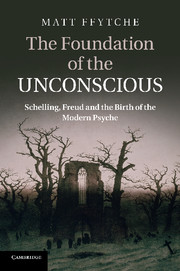Book contents
- Frontmatter
- Contents
- Acknowledgements
- Introduction: the historiography of the unconscious
- Part I The subject before the unconscious
- Part II The Romantic unconscious
- Part III The psychoanalytic unconscious
- 6 Freud: the Geist in the machine
- 7 The liberal unconscious
- Conclusion
- Bibliography
- Index
- References
6 - Freud: the Geist in the machine
Published online by Cambridge University Press: 05 December 2011
- Frontmatter
- Contents
- Acknowledgements
- Introduction: the historiography of the unconscious
- Part I The subject before the unconscious
- Part II The Romantic unconscious
- Part III The psychoanalytic unconscious
- 6 Freud: the Geist in the machine
- 7 The liberal unconscious
- Conclusion
- Bibliography
- Index
- References
Summary
The barriers suddenly lifted, the veils dropped, and everything became transparent … Everything seemed to fall into place, the cogs meshed, I had the impression that the thing now really was a machine that shortly would function on its own.
[Y]ears afterwards, they create the repetition in their dreams, but in their dreams they leave out the hands that held them, so that now they hover and fall freely.
The last three chapters have shown how a particular set of ideas constellate around Schelling’s project of grounding the identity of the individual. His drift away from the terms of an absolute idealism, in search of concepts with which to underpin the autonomous nature of the self, led him to forge a new philosophical vocabulary centring on the psyche, the unconscious, a tension over the past and forgetting, and the enigma of (ontological) birth. If an omnipotent God or an absolute structure of reason threatened to make the individual into a posterior effect of a prior set of determining causes, the unconscious indicated to Romantic philosophers, psychologists and anthropologists ‘precisely our ownmost and most genuine nature’. What does it mean, then, when these terms from the post-idealist philosophy of freedom re-emerge in the project of psychoanalysis? Do they still function in the same way? Not only does psychoanalysis stake out its own ground for a science of the soul, but Freud undoubtedly also centred his account of the person on a similar constellation of terms: the unconscious, the past and a traumatic relation to origins. Ellenberger suggests that Freudian psychoanalysis is in any case ‘a late offshoot of Romanticism’, while for Odo Marquard ‘psychoanalysis is a disenchanted Romantic Naturphilosophie, that’s why it thinks in the manner of this Naturphilosophie’. In order to understand the hold psychoanalysis gained over the human sciences in the first half of the twentieth century, should we be setting it not in the context of the 1900s, but in the much wider frame of problems emerging already in the 1800s? What would psychoanalysis look like viewed from this perspective?
Alternatively one could argue that looking backwards may give us ‘background’ histories of the significance of such notions – the unconscious, the trauma of individuality – before they become established as psychoanalytic ones. But in psychoanalysis they are given new functions and new points of reference and we may usefully draw a line in the history of the topic dividing the 1890s from the 1810s. Far from having any power to elucidate the psychoanalytic theory of the psyche, the relationship is now reversed and idealist forebears are more likely to crop up as case studies in neurosis. Ronald Britton, former president of the British Psychoanalytical Association, relates the case of Miss A, who ‘was imprisoned in a subjective monistic world exactly like that envisaged by such philosophers as Schelling, in his “Transcendental Idealism”’. Not only has Schelling’s complex labour to introduce tension and freedom into absolute notions of system been reduced to a caricature of the kinds of position he eventually found untenable, but all sense of Schelling’s connection with the development of the unconscious itself has been effaced. Such retranscriptions of the relationship between philosophy and psychoanalysis are not a late twentieth-century development; they go back to the early years of the movement. Alfred von Winterstein, in the second issue of Imago, noted that ‘every consistently developed idealism leads to a solipsism, to which even non-psychoanalysts have to ascribe a pathological character. Despite the importance of his ideas, an idealist system such as Fichte’s lies on this path’.
- Type
- Chapter
- Information
- The Foundation of the UnconsciousSchelling, Freud and the Birth of the Modern Psyche, pp. 217 - 254Publisher: Cambridge University PressPrint publication year: 2011



